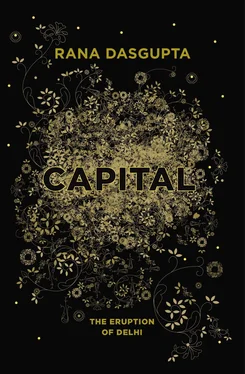At times one can feel, it is true, that this city’s motto is: I network, therefore I am. People carry their networks with them everywhere, cite them, name-drop them, as if without them they would cease to exist. Facebook has slotted in perfectly into the life of the city, being only a technological representation of what already existed. Sometimes when you go to Delhi society parties you feel you are in a kind of Facebook reality game. People come up to you that you hardly know, they seem strangely, even excessively happy to see you again and greet you sentimentally. You didn’t even realise you were friends, but after such a display you feel the need to show some curiosity. “How have you been?” you ask. But by then they have moved on, and they look at you in surprise, as if to say, “You? You’re still here?” They are already scanning for the next encounter, and you realise that what has just happened is not something that belongs to the real world of bodies mingling and conversing in a space, but something that belongs to online. You have been ‘poked’.
“Delhi is being taken over,” says Meenu, “by contractors who know how to manipulate these systems. Bureaucrats are willing to sell themselves, partly because they come, increasingly, from deprived backgrounds. They have genuine problems, they feel they’ve suffered in the past, and they think it’s their right to get something back from everyone else. If you talk to them, they’re never doing it for themselves; they want to improve the lot of their whole community. And such people place a lot of significance on markers of status — chauffeurs, networks, contacts, invitations.”
“Does no one fear getting caught?” I ask.
“Of course. They’re very concerned about getting caught. It’s very embarrassing to be caught. But what I’ve noticed recently is that this has stopped being a deterrent. Getting caught is increasingly unrelated to anything you have actually done. There’s a kind of fatalism about it. Recently a senior bureaucrat came to give a training session and he asked attendees what might lead to them getting caught. ‘Accepting bribes,’ suggested the students. ‘No.’ ‘Breaking procedure.’ ‘No.’ ‘Accepting favours.’ ‘No,’ said the instructor. ‘You will get caught when your destiny turns bad.’ You hear that more and more often. Somebody else said recently, ‘Being caught doing something wrong is like being hit by a car. It could have happened to anyone, but it happened to you. It’s entirely random. There’s no way you can predict it.’
“There is no longer any constraint except bad fate. Which you can’t do anything about anyway. So you might as well carry on.”
• • •
Indira Gandhi’s cult of the self inevitably provoked resentment and consternation, and in 1975 she went to the Allahabad High Court to answer allegations of malpractice in the 1971 elections. The court decided against her on two counts, which thus rendered the election result void. An appeal was registered with the Supreme Court. Before any verdict could be reached, however, Mrs Gandhi declared a national state of emergency. Explaining this extreme measure on national radio, she said, “This is nothing to panic about. I am sure you are all conscious of the deep and widespread conspiracy, which has been brewing ever since I began to introduce certain progressive measures of benefit to the common man and woman of India.”
A dictator by personality, Indira Gandhi flourished under the autocratic conditions of the Emergency. She jailed her opponents, including two future prime ministers and one future deputy prime minister — Morarji Desai, Atul Bihari Vajpayee and Lal Kishanchand Advani respectively — and the remarkable Jayaprakash Narayan, who had long been campaigning for a wholesale renewal of Indian political and social life through what he called a non-violent total revolution. Narayan’s imprisonment provoked especial outrage, including in the international press, since he was a powerfully principled leader who had at one point been very close to the Nehru family — it was as if Mrs Gandhi were imprisoning an uncle — but the prime minister’s rampage had hardly begun. She had always disliked the dispersal of powers inherent to India’s federal structure: when state government terms ended in Tamil Nadu and Gujarat she cancelled elections and administered the states directly from Delhi. Freedom of the press was cancelled, and sweeping changes were made to the constitution to remove curbs on prime ministerial power. Amnesty International estimated that 140,000 people were imprisoned without trial and, in many cases, tortured, during the twenty months of the Emergency. The Emergency traumatised universities, many of which were vocal in their opposition; it also gave great moral standing to the Sikh parties and radical Hindu groups, many of which maintained principled criticism in the face of Indira Gandhi’s onslaught.
For some, the Emergency did not seem so bad. There was a new-found, nervous order to social life, which stood in marked contrast to the political disruptions of the previous years. Business enjoyed the comparative regularity of labour and supplies, and the unusual efficiency of the bureaucracy in issuing licenses. It seemed to many that the experiment of Indian democracy was over, and some — such as that punning courtier who supplied the refrain, “Indira is India, and India is Indira” — began to sing the praises of the new dictatorship.
But in Delhi, the Emergency left a particularly violent imprint through the astonishing rise to power, during this period, of Indira’s adored eldest son, Sanjay. The first of Delhi’s political bad boys, he was one of those dangerous patriots who love the idea of their country but hate its reality. He was plagued by nightmares of filthy, exponentially reproducing masses, and he longed to destroy, to root out, and to impose hygiene and order. Twenty-nine years old in 1975, balding, and with a curled mouth that seemed to display some dark and disturbing sensuality, Sanjay suddenly became his mother’s closest adviser, and indeed began to enact, of his own personal will, major social policies. It is a sign of what dizzying extraordinary powers Indira Gandhi had managed to win for herself that her son, who held no political position of his own, was able to depend on such obedience from his coterie of powerful sycophants
In Delhi, he launched a major programme of slum demolition, which delighted the ambitious vice chairman of the Delhi Development Authority, Jagmohan Malhotra. Malhotra sent bulldozers to demolish the slums of Old Delhi, producing a stream of 700,000 refugees who settled in the south and east of the city (where they would encounter a fresh wave of merciless demolition in the mid-2000s). But this upheaval was rendered all the more traumatic because these people were also especially targeted by Sanjay’s other big scheme of male vasectomy. Administered through public servants, such as policemen and school teachers, who were required not only to go through the operation themselves, but also to deliver prescribed numbers of men for vasectomy every day if they wanted to keep their jobs and receive their salaries, this immediately turned into a brutal and arbitrary process whose burden fell disproportionately on the poorest and most powerless.
Among the poor Muslims of Old Delhi, these two schemes together brought back perennial fears that the purges of 1947 would one day be taken to their completion, and the tension escalated into the most terrifying battles between communities, police, demolition vehicles and vasectomy squads. The Indian state, which had arisen, in part, out of outrage against the excesses of the British against ordinary citizens, seemed to have parted its cloak to reveal some genocidal organ of its own — and there was thenceforth no level of sickness and cruelty where the imagination could not reach, especially where the poor were concerned.
Читать дальше











